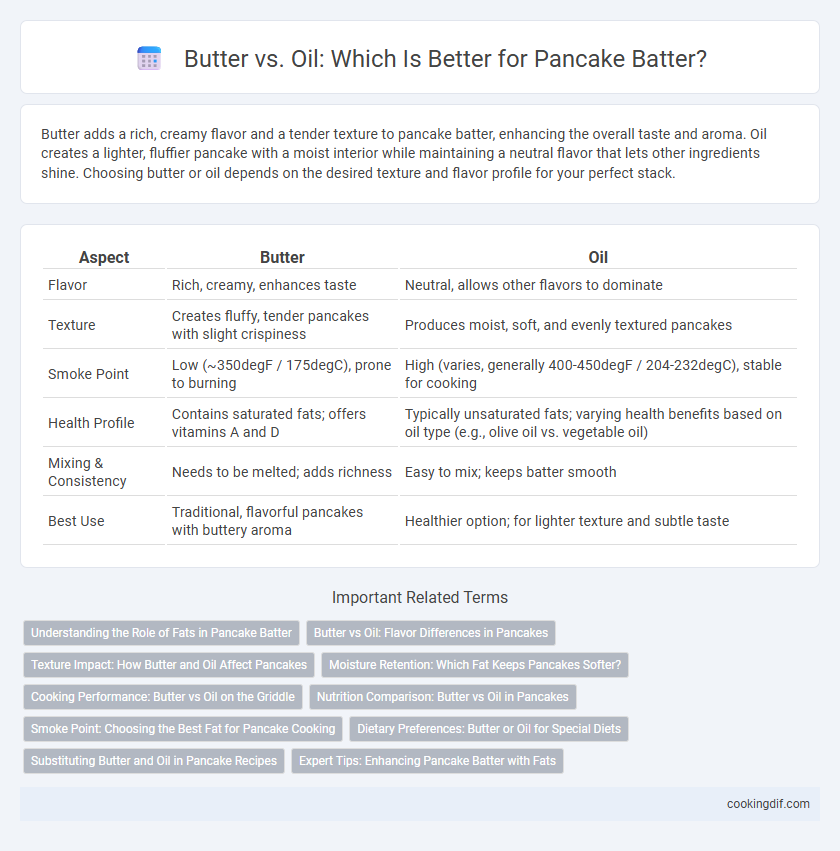Butter adds a rich, creamy flavor and a tender texture to pancake batter, enhancing the overall taste and aroma. Oil creates a lighter, fluffier pancake with a moist interior while maintaining a neutral flavor that lets other ingredients shine. Choosing butter or oil depends on the desired texture and flavor profile for your perfect stack.
Table of Comparison
| Aspect | Butter | Oil |
|---|---|---|
| Flavor | Rich, creamy, enhances taste | Neutral, allows other flavors to dominate |
| Texture | Creates fluffy, tender pancakes with slight crispiness | Produces moist, soft, and evenly textured pancakes |
| Smoke Point | Low (~350degF / 175degC), prone to burning | High (varies, generally 400-450degF / 204-232degC), stable for cooking |
| Health Profile | Contains saturated fats; offers vitamins A and D | Typically unsaturated fats; varying health benefits based on oil type (e.g., olive oil vs. vegetable oil) |
| Mixing & Consistency | Needs to be melted; adds richness | Easy to mix; keeps batter smooth |
| Best Use | Traditional, flavorful pancakes with buttery aroma | Healthier option; for lighter texture and subtle taste |
Understanding the Role of Fats in Pancake Batter
Butter adds rich flavor and contributes to a tender crumb in pancake batter by incorporating milk solids and water that create steam during cooking. Oil, being 100% fat, provides a moist texture and helps pancakes retain softness without adding extra flavor. Understanding that fats influence both texture and taste is key to selecting the right fat for desired pancake characteristics.
Butter vs Oil: Flavor Differences in Pancakes
Butter imparts a rich, creamy flavor and a slightly nutty aroma to pancakes, enhancing their overall taste with a hint of caramelization during cooking. Oil, typically neutral in flavor, results in a lighter and more subtle taste, allowing other ingredients like vanilla or fruit to shine through. Choosing butter over oil intensifies the savory profile, while oil offers a cleaner, less pronounced flavor in pancake batter.
Texture Impact: How Butter and Oil Affect Pancakes
Butter adds a rich, creamy texture to pancake batter, resulting in tender, moist pancakes with a slightly crisp edge. Oil contributes to a lighter, fluffier texture due to its liquid state, promoting even moisture distribution without the added density of butter. Choosing butter or oil directly influences pancake softness and mouthfeel, with butter delivering a richer taste and oil enhancing delicate fluffiness.
Moisture Retention: Which Fat Keeps Pancakes Softer?
Butter contains milk solids and water that contribute to moisture retention but can cause pancakes to brown faster, while oil, being 100% fat, helps pancakes stay softer and moister for longer by preventing excessive moisture loss. The type of fat impacts the texture, with oil yielding a more tender crumb due to its liquid state at room temperature. Studies show pancakes made with oil maintain softness better over time compared to those made with butter, which tend to dry out more quickly.
Cooking Performance: Butter vs Oil on the Griddle
Butter creates a rich, golden-brown crust on pancakes due to its milk solids caramelizing on the griddle, enhancing flavor and texture. Oil provides a higher smoke point, allowing consistent heat without burning, resulting in evenly cooked pancakes with a lighter texture. Choosing butter or oil impacts browning intensity, crispness, and overall taste of the pancake batter on the cooking surface.
Nutrition Comparison: Butter vs Oil in Pancakes
Butter provides saturated fats and fat-soluble vitamins like A, D, and E, enhancing the pancake's flavor and nutritional profile. Oil, often vegetable or canola, offers unsaturated fats that support heart health and reduce cholesterol levels when used in moderation. Choosing between butter and oil influences the pancake's calorie content, fat composition, and overall health benefits.
Smoke Point: Choosing the Best Fat for Pancake Cooking
Butter has a lower smoke point of approximately 350degF (177degC) compared to most oils, which often exceed 400degF (204degC), making oil a more stable option for higher-heat pancake cooking. Using oil like canola or vegetable oil reduces the risk of burning and developing bitter flavors during batter cooking. For a richer taste and browning effect, clarified butter or ghee with a higher smoke point around 485degF (252degC) combines flavor benefits with better heat tolerance.
Dietary Preferences: Butter or Oil for Special Diets
Butter provides a rich flavor but contains saturated fats and dairy, making it less ideal for vegan or lactose-intolerant diets, while oil offers a neutral taste and is often preferred in plant-based and allergy-friendly pancake batters. Coconut oil and olive oil add unique flavors and healthy fats that suit paleo and gluten-free lifestyles. Choosing between butter and oil depends on dietary restrictions, flavor preferences, and nutritional goals in pancake recipes.
Substituting Butter and Oil in Pancake Recipes
Butter adds a rich flavor and tender texture to pancake batter, while oil contributes to a lighter, fluffier result with increased moisture retention. When substituting butter with oil, use about 75% of the butter amount to maintain the right batter consistency and prevent greasiness. Replacing oil with melted butter can enhance flavor but may slightly reduce pancake fluffiness due to butter's water content and milk solids.
Expert Tips: Enhancing Pancake Batter with Fats
Using butter in pancake batter adds rich flavor and creates a tender crumb due to its milk solids and water content, which promote browning and moisture retention. Oil, especially neutral oils like canola or vegetable, contributes to a lighter, fluffier texture by coating flour proteins and inhibiting gluten formation. Experts recommend melting butter for even distribution or combining both fats to achieve a balance of flavor and optimum batter consistency.
Butter vs Oil for Pancake Batter Infographic

 cookingdif.com
cookingdif.com